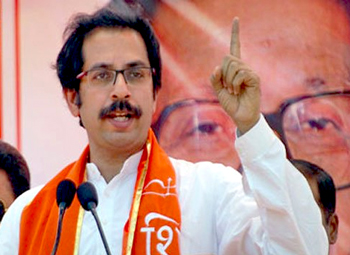Mumbai, Oct 20: A day after BJP emerged as the single largest party in Maharashtra, Shiv Sena today took a swipe at Narendra Modi, saying the "wave" seen during the campaign lost its force even before reaching the shores and expressed doubts over survival of the state amid a hung House.

"Break up of the Sena-BJP alliance and division of votes due to four and five-cornered fights in all seats benefited BJP as well as Congress-NCP. The Sena-BJP split benefited Congress-NCP. Given the Lok Sabha results, both these parties could not have won more than 25 seats together," an editorial in today's issue of Sena's mouthpiece 'Saamana' said.
The Shiv Sena will not comment on how it views the results as of now, because what is important is the view of the "all powerful voters" who gave a fractured verdict, it said.
"With no party getting a clear majority, there are doubts how the state will survive because of the instability," the editorial said.
Taking a swipe at Modi and the BJP, the editorial said, the "wave" seen during the campaign had lost its force even before reaching the shores.
"In some places, there was more foam and less water in the wave," it quipped.
"People have not given a clear mandate to any party. Still, if people are blowing their victory trumpets, we congratulate them. We will continue to serve Maharashtra because Shiv Sena is born for that purpose only. More than our view on the post poll scenario, we would like to ask people if they are happy with the fractured verdict," the editorial said and lamented that Maharashtra is again being pushed into instability and anarchy.
It said Shiv Sena fought a lonely battle for strong and united Maharashtra against "two powerful rulers."
"BJP brought its Prime Minister and the entire Union Cabinet in the state as well as the party machinery from other states ruled by it. Despite all this, the success achieved by Shiv Sena is priceless. We thought Shiv Sena would get a clear majority based on the feedback received during the campaign," it said.





Comments
Add new comment